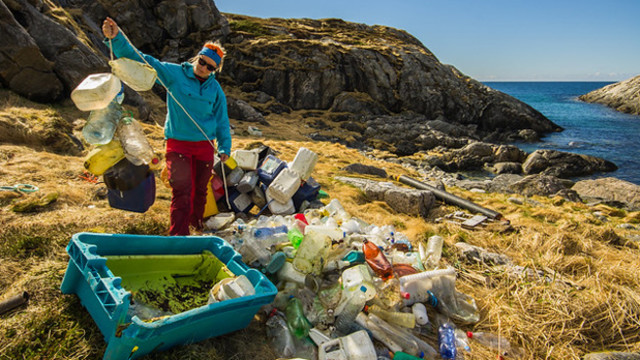We need more than business as usual, to leave no one behind
In the latest blog in our series exploring how business and investors can contribute to achieving the Sustainable Development Goals, Rijit Sengupta discusses the challenges and opportunities for businesses in India seeking to raise the bar on sustainability.


Tea pickers at a Darjeeling tea processing unit (shankar s, via Flickr, CC BY 2.0)
Last year, many of us saw the shocking images of the Amazon burning, caused by fires to clear the forest – allegedly for the expansion of soy plantations and cattle ranching.
Footage of the raging fires and devastation to plants and animals has left many asking questions about the origin of ingredients in products from Brazil. As a result, companies that use commodities sourced from the Amazon risk losing support from consumers worldwide.
But Brazil is not the only country where surging demand for commodities such as soy and meat is leading to widespread deforestation. Expansion of palm plantations in Indonesia is similarly causing considerable forest denudation.
Indiscriminate tree felling and clearing of forests is just one of the damaging, unsustainable practices driven by unrelenting production and consumption demand. Across production networks we have seen children working in the supply chain of top global companies, workers without legal or social protection being abruptly laid off, and unsafe working conditions causing injury and death in factories. The list is long.
Negative social and environmental impacts along their value chain pose considerable ‘risks’ to companies. With companies coming under ever greater scrutiny, and growing demands to address these impacts, it is perilous for them to ignore these risks.
The SDGs: a tool to manage risks
Examining the sustainability impacts of their business processes and practices (including along their value chains) can help companies detect and mitigate these risks. The Sustainable Development Goals (SDGs) offer a valuable framework to do so.
For businesses in an emerging economy such as India with highly competitive markets, balancing social, economic, and environmental expectations to improve sustainability often requires recalibrating business models and strategies.
The Centre for Responsible Business' (CRB) engagement with a number of Indian companies such as Mahindra & Mahindra, MARICO, AAK Kamani and Shahi Exports – as well as multinationals such as H&M – throws up a number of factors. In the case of Indian suppliers to international businesses, embracing sustainable business strategies has enhanced their ability to access foreign markets and strengthen international partnerships.
For leading businesses that are domestically oriented, strong commitment to values and traditions at the leadership level have driven them to address needs of communities and workers, and to preserve the environment.
Higher demands, greater expectations
Ever more exacting consumers and vigilant civil society watchdogs bring companies under growing pressure to prove that sustainability is embedded in their business strategies and plans. And these higher expectations permeate through the entire business chain, from local to national to international level.
Blog: Ten reasons why we have to rewrite the sustainability rule book, and now – Mike Barry shares tips on how to become a sustainable business leader of tomorrow
Interview: IIED’s Laura Kelly puts questions to Chris West from Sumerian Partners on the lessons and challenges from impact investing
Blog: When investors go green – Pernille Holtedahl unpacks the growing appetite for green bonds
Blog: Is Davos signalling the end of business as usual? – to coincide with the World Economic Forum, Andrew Norton asks how a progressive sustainability manifesto can omit climate change
Blog: Wanted: corporate global citizens to deliver the SDGs – as global citizens, businesses have a prominent role in the collective achievement of the SDGs, explains David Croft
A multinational company sourcing ingredients or products from a domestic supplier in India will often have strict standards about where commodities are sourced from, will expect that source to be easily traced and will want to be able to check means and methods of production (that processes are sustainable, fair labour standards are enforced and suitable safeguards are in place to prevent child labour and so on).
Carrying out such necessary checks and balances forms part of a company’s strategy to detect and mitigate risks in their value chain.
However, the expectations between the two parties – a multinational company buyer and an emerging economy domestic supplier – are often not aligned. Consequently, many risks in the value chain remain unaddressed or undiagnosed.
Top down must meet bottom up
Buyers from multinational companies often rely on frameworks, codes of conduct and templates administered by a battery of skilled consultants and auditors to diagnose and address risks from the top down. But the efforts of influential international businesses to impose their sustainability standards on to suppliers has not been 100% successful; in many cases, expected outcomes are achieved only at tier one levels, where the challenges are much less.
Sustainability ‘standards’ set by multinationals are seldom grounded in the context of supplier countries, and there is growing realisation and evidence about this. Furthermore, views of stakeholders are not incorporated in developing these ‘standards’.
There is, however, growing recognition that these top-down frameworks, codes of conduct and sustainability standards will only be effective if they connect with actors (stakeholders) from the bottom up.
CRB has been an ardent advocate of such collaborative approaches to sustainability initiatives across India’s industry sectors. Together with like-minded and interested partners, CRB has pioneered bringing global sustainability standard-setters closer to Indian stakeholders to enable a better mutual understanding of key sustainability challenges and risks, and of how businesses can contribute to tackling them.
The SDGs call on businesses to raise the bar on the sustainability. But commitments will not be met unless there is greater scope and more opportunities for stakeholders to be involved in the design and implementation of tools that support achievement of complex sustainability outcomes in the value chain.
If we want to deliver the SDGs’ mantra to leave no one behind, it can’t be business as usual.



